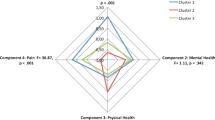Summary
After elucidating the components and theory of neuroticism (N) as well as of psychosomatic complaints and their relationships to personality dimensions and to psychosomatic diseases, comparisons are performed between patients suffering from fibromyalgia syndrome (FMS) or related pain diseases with healthy subjects scoring high on personality dimensions related to neuroticism. FMS and pain patients score high on depression, anxiety, and experience of stress although questionnaire scores on depression are higher in subjects not exhibiting somatic features of the disease. High subjective pain sensitivity and low thresholds for pain perception are also common features in high N subjects and FMS patients. On the endocrinological level cortisol responses to challenge tests with CRH as well as prolactin responses to TRH are higher in FMS patients than in high N healthy subjects indicating an endocrinological difference. A common feature, however, is the lack of adapatability in the two groups, since neurotics are in particular characterized by a low capacity to shift their behavior from one state to the other (waking-sleeping, working-relaxing), to re-adapt to baseline levels after endocrinological or physiological stress responses, or to adjust to conditions of shift work. This is reflected by chronobiological disturbances in FMS patients and could also explain their maintainance of pain perception, because they are incapable of correcting conditioned pain-producing muscle tension.
Zusammenfassung
Nachdem die Komponenten und Theorien des Neurotizismus, der psychosomatischen Beschwerden und ihrer Beziehungen zu Persönlichkeitsdimensionen und psychosomatischen Erkrankungen aufgezeigt worden sind, geben einige Vergleiche zwischen Fibromyalgie (FMS) Patienten und gesunden Personen mit hohen Neurotizismuswerten im Fragebogen Aufschlußüber Gemeinsamkeiten und Unterschiede. FMS-Patienten haben gewisse Gemeinsamkeiten mit Neurotikern im Hinblick auf Depression, Angst und Belastungserleben, obwohl die Depressionsfragebogenwerte bei Schmerzpatienten ohne somatische Basis höher sind. Auf endokriner Ebene sind die Reaktionen auf Provokationstests mit TRH oder CRH bei FMS-Patienten höher als bei neurotischen Personen in der Normalbevölkerung, was auf gewisse endokrinologische Unterschiede hinweist. Eine Gemeinsamkeit hingegen liegt vermutlich in dem Mangel an Anpassungsfähigkeit bei Neurotikern und FMS-Patienten, da sich bei Neurotikern in verschiedenen Studien gezeigt hat, daß sie durch eine geringere Fähigkeit zur Umschaltung im Verhalten (z. B. Schlafen/Wachen, Arbeit/Entspannung) gekennzeichnet sind, bei physiologischen und endokrinologischen Auslenkungen durch Streß verspätet auf die Ausgangswerte zurückkehren, und ihre endokrinen Rhythmen bei Schichtarbeit ebenfalls schlechter umstellen können. Dieses Phänomen könnte auch die Aufrechterhaltung von Schmerzwahrnehmung bei FMS-Patienten erklären, die eine gewisse Unfähigkeit zeigen, schmerzerzeugende Schonhaltungen und Muskelverspannungen zu korrigieren.
Similar content being viewed by others
Author information
Authors and Affiliations
Rights and permissions
About this article
Cite this article
Netter, P., Hennig, J. The fibromyalgia syndrome as a manifestation of neuroticism?. Z Rheumatol 57 (Suppl 2), S105–S108 (1998). https://doi.org/10.1007/s003930050248
Issue Date:
DOI: https://doi.org/10.1007/s003930050248




